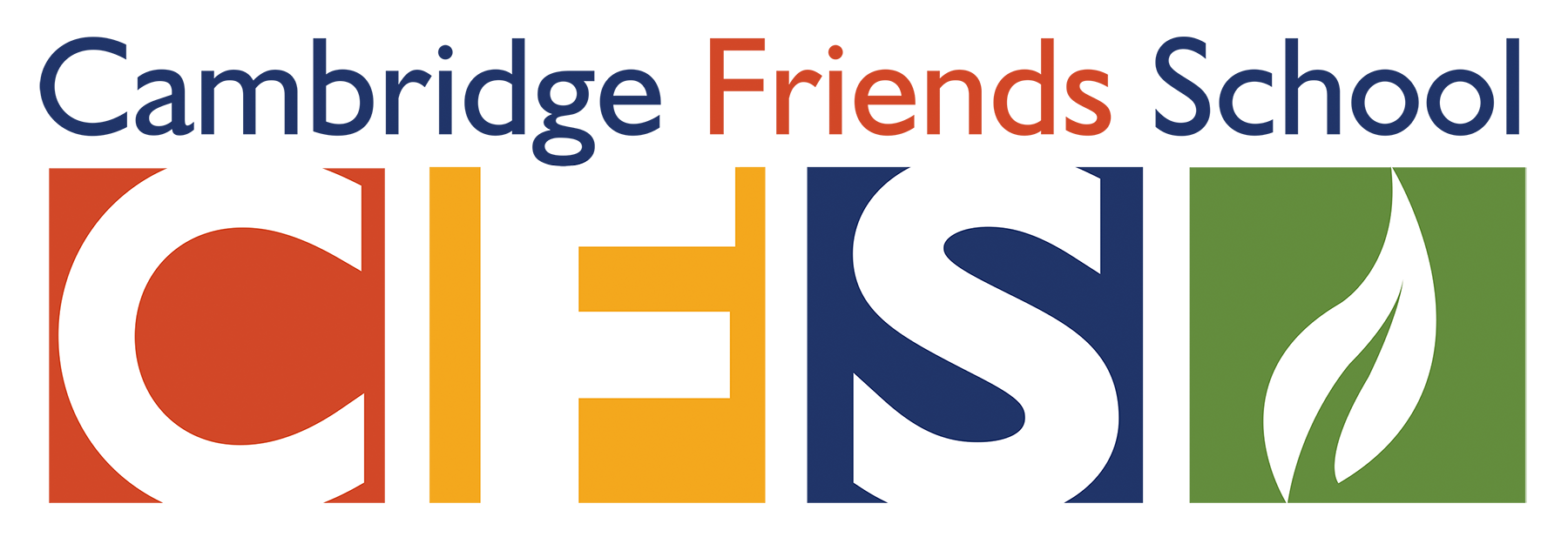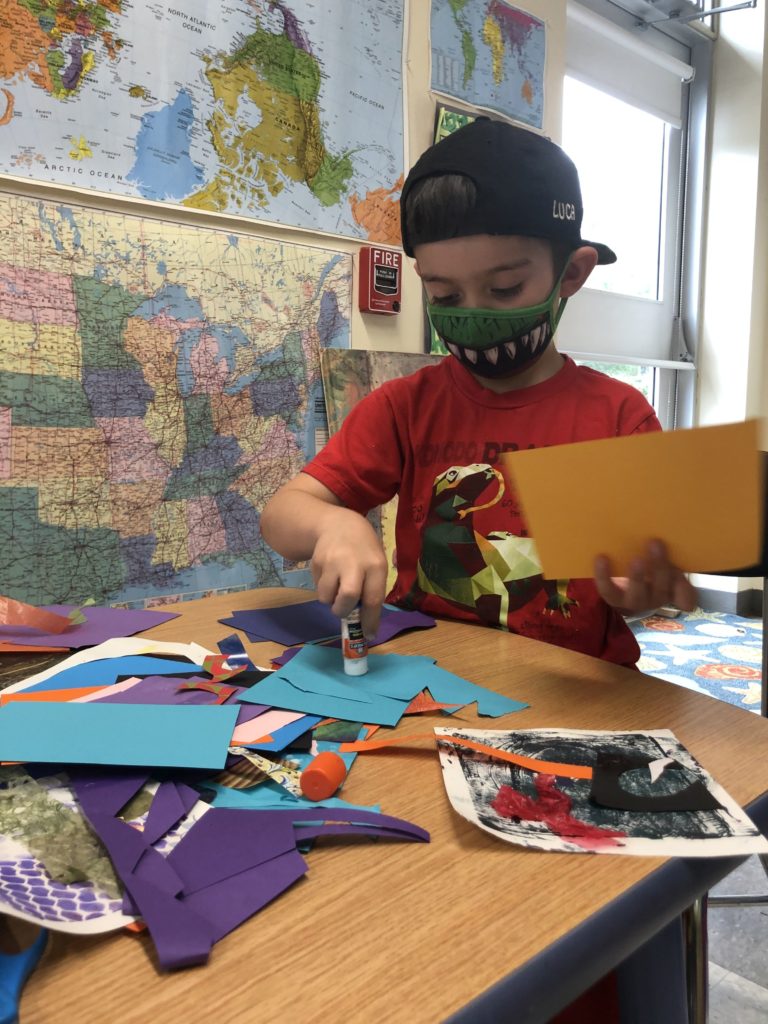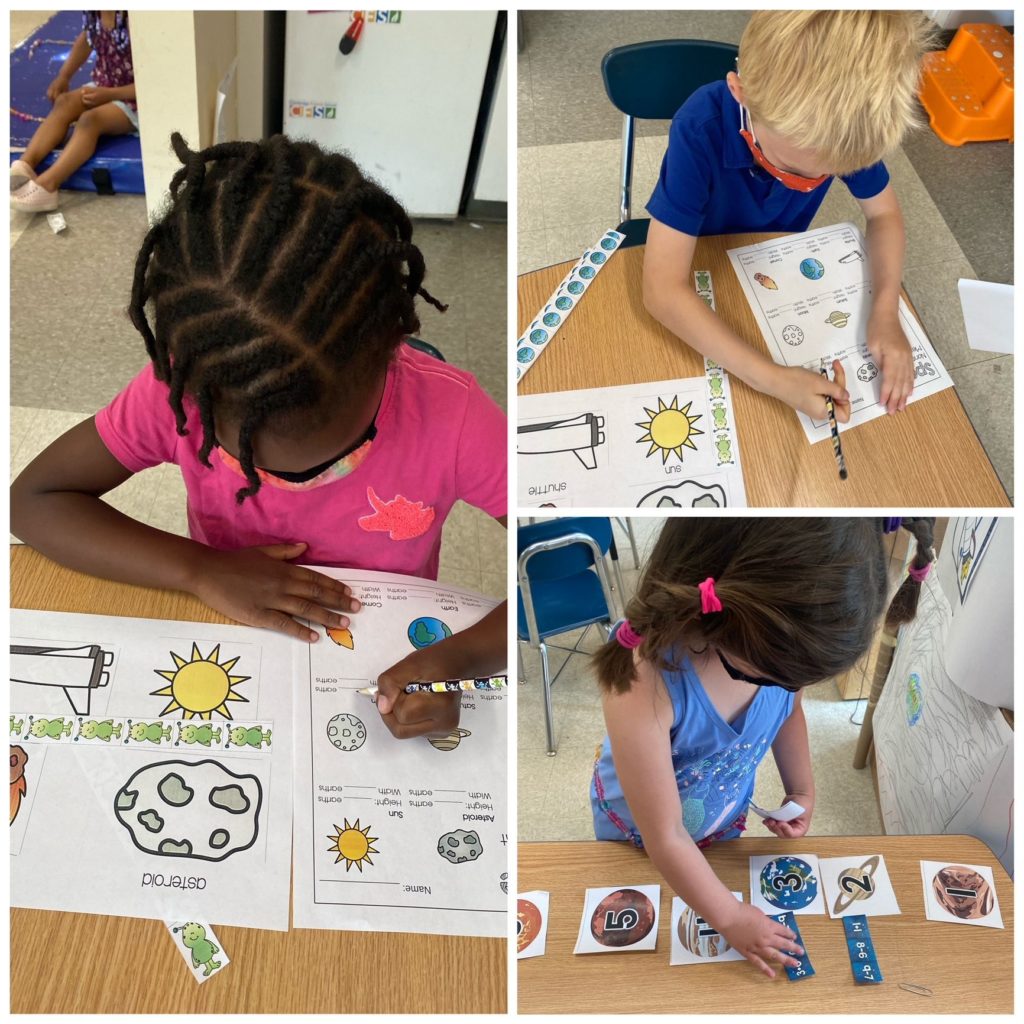Kindergarten Curriculum
Overview and Highlights
In the Cambridge Friends School Kindergarten program, students develop foundational skills in academic areas, while beginning to understand their place as members of the classroom and community. They learn in different ways, including explicit instruction in mathematics, literacy, and social studies, projects, self-directed learning, teacher-supported activities, and play. The classroom environment is a key element of the curriculum and is carefully planned and stocked by teachers with specific developmental goals in mind and in response to childrens’ interests and needs. It’s design, offerings, and the organization of materials address the needs of students, inspire creativity and inquisitiveness, and scaffold the development of ideas and learning.
The materials chosen are interesting, welcoming, and engaging. Spaces are designed for students to move their bodies, use large muscles and coordination, and accomplish fine motor challenges. There are swings, climbing walls, and gym mats that provide opportunities for students to develop gross motor skills and coordination, use energy, and develop ways to sooth themselves and self-regulate both physically and emotionally.
Students take ownership of the classroom space by taking on weekly classroom jobs and acting as environmental stewards through multi-grade composting and recycling programs. They develop an understanding of and respect for different identities and cultures and are empowered to stand up for justice, equity, and their beliefs. The Quaker value of continually seeking truth creates the backbone for students’ deep analytical approach to asking interpersonal, academic, practical, and philosophical questions.
Literacy
In Kindergarten, Cambridge Friends School uses the Wilson Language Fundations® Program, teaching and learning direct skills and strategies for building strong readers and writers. Students will learn how to properly form letters and write using sound-spelling relationships. To achieve this, this program focuses on children’s phonological awareness, spelling, letter formation, word chunks, trick words, whole words, and sentences.
In addition to direct instruction in Kindergarten, teachers at Cambridge Friends School organically weave literacy into everyday interactions. For example, throughout the day, students have opportunities for book making, storytelling, reading the “Question of the Day” upon arrival, reading aloud and shared reading, independent reading, and writing notes for use in play. One student might make signs for their pretend store in the dramatic play area, while another might write a “save” sign to put on a block structure. Young children’s excitement in communicating their thinking is channeled into skill building activities (such as journal, story, and note writing) and integrated into academic subjects.
By the end of the school year, these are some of the skills that we expect CFS Kindergarten students will have developed:
- Connect letters with their sounds
- Recognize and form all uppercase and lowercase letters of the alphabet
- Recognize familiar words and select words from Fundations® in print
- Discern separate syllables
- Understand the information in a book and make predictions using pictures as a guide
- Sound out words when writing (capture most sounds of words when writing)
- Know, recognize and use conventions of writing and printed text
- Identify and isolate initial, medial, and end sounds of words
- Repeat and create rhymes
- Keep track of events in a story and keep track of events when retelling
Math
Kindergarten students use the curriculum Investigations in Number, Data, and Space in Math Workshops by TERC©. Investigations is a comprehensive program that provides opportunities to learn mathematical concepts (organized into four areas: number and operations, measurement, geometry, and data analyses) and disciplinary practices. These foundational disciplinary practices encourage students to think and behave like mathematicians. In Math Workshops, CFS scaffolds the development of a learning community and skills that support students’ abilities to take intellectual risks and work collaboratively, providing a foundation for students to build on in future years as group math work continues in later grades. Finally, throughout the program, students are provided planned opportunities and take advantage of naturally-occurring teachable moments in which they can count, record, measure, find patterns, and solve problems in their play and lives.
By the end of the school year, these are some of the skills that we expect CFS Kindergarten students will have developed:
- Count, compare, and combine quantities up to 10
- Rote count by 1’s and 10’s to 100; when counting by 1’s, start from a number other than 1
- Begin to count by 2’s, 5’s and 10’s
- Decompose a number into two addends in more than one way
- Can make appropriate comparisons (e.g., bigger, smaller, heavier, more than, less than, the same, etc.)
- Find combinations of shapes to fill an area
- Use and develop strategies to determine length of an object, recording measurements with pictures, numbers, and words
- Construct and extend repeating patterns by adding repeating units
- Divide materials fairly between two or more people
- Sort, compare, and contrast multiple attributes of objects
- Connect number words, numerals, and quantities
Social Studies
The life stories of “People of Inspiration” help students to learn about how people can embody values and to make connections to their actions in daily classroom life. Students learn about integrity through Barack Obama, Peace through Mahatma Gandhi, and Simplicity through George Fox. Studying the life work of these people of inspiration allows students to see an illustration of the Testimonies in action.
- Integrated in both Pre-Kindergarten and Kindergarten classrooms, the social studies curriculum is grounded in the Quaker Testimonies of Peace, Integrity, Simplicity, Equality, Community, and Stewardship
- Learning about George Fox and Margaret Fell helps students understand the activist roots of the Religious Society of Friends
- Students practice negotiation skills and the ability to work with others towards a mutual solution
- Exploration of different racial identities within the American context through the lens of influential historic characters and events such as Christopher Columbus’ story, and the Native/First Nations People and the White/European Peoples’ perspectives
- Personal identity exploration helps students to better understand their classmates’ participation in race-based affinity groups
- Students are introduced to the concept of being an ally to others
- Begin to understand people’s roles in families and the variety of family structures
- Understanding the influence of dominant culture on the stereotypical family unit
- Basic understanding of respecting the rights and property of others
- Basic understanding of how people can affect change on both an interpersonal and global scale
By end of the school year, these are some of the skills that we expect CFS Kindergarten students will have developed:
- Recognize characteristics of “People of Inspiration” that are in common with themselves and their community
- Engage in meetings and activities
- Be able to express a point of view
- Have a context for thinking of the American construct of racial identity
Science
Our goal is for each student to build on their natural curiosity and engagement with the physical world around them as they explore a range of topics from each of the four domains of science: life science, physical science, earth/space science, and technology/engineering. This work consists of emergent, student-directed explorations as well as some more structured experiences introduced by teachers such as caring for caterpillars and building and exploring simple machines. As they develop curricular experiences for students, classroom teachers make use of the Next Generation Science Standards (NGSS) and a variety of science curricula, as well as teacher-developed materials and investigations that respond to student interests.
By end of the school year, these are some of the skills that we expect CFS Kindergarten students will have developed:
- Seek information about the natural world
- Express an interest in sand, water, sound, tools, and simple machines
- Seek answers to questions through active investigation
- Use tools to gather information
- Experiment to discover the properties of materials
- Recall and use prior information to make connections
- Begin to make predictions and test ideas or hypotheses
- Begin to record and communicate observations and thinking to others
- Form explanations based on observation and experimentation
- Demonstrate a beginning awareness of technology and how it affects their life
- Begin to record observations using words and pictures
Art
Kindergarten students begin the year with an introduction to the studio environment. In the studio, students are presented with specific design or construction challenges, or questions to explore, using familiar materials. Young children are taught the specific ways to handle tools and materials safely and effectively, and then given room to explore their own ideas. As the year progresses, more unique and complex art making tools and processes are introduced to students. Some of the concepts explored in the art studio include recognizing colors, shapes, and patterns, identifying textures, and becoming familiar with the properties of particular materials. Students mix paint colors, collage with paper “treasure,” experiment with printmaking, build three-dimensional structures with recycled materials, mold with clay, and embroider with yarn and fabric.
By the end of the school year, these are some of the skills that we expect CFS Kindergarten students will have developed:
- Experiment with the under-over pattern of weaving and the basic running stitch used for sewing and embroidery
- Build pinch pots and slip and score when joining pieces
- Explore a range of construction strategies including taped recycled materials, papier-mâché, and slotted paper
- Cut symmetrical shapes on a fold
- Create 3D paper sculptures
- Use drawing to communicate ideas from their imaginations
- Focus on line, pattern, and composition in abstract drawings
- Practice mixing primary colors to make secondary colors and other color mixing experiments
- Experiment with layering washes of watercolor to change colors
- Explore a wide range of ways to create a series of patterns, textures, or imagery on paper
Physical Education
Students in Kindergarten are involved in a movement-based curriculum that focuses on strengthening gross motor skills and emphasizes boundaries, spatial awareness, loco-motor patterns, rhythmic movement, and hand-eye coordination using a multitude of materials (balls, hoops, ribbons, scooters, etc.).
By the end of the school year, these are some of the skills that we expect CFS Kindergarten students will have developed:
- Demonstrate improved self-confidence
- Improved decision-making skills when participating in partner, small-sided, and large group activities
- Exercise movement concepts of dodging and fleeing through tagging games
- Demonstrate the value and benefit of fitness routines with partial and full sit-ups, curl-ups, push-ups, stretching, and flexibility exercises
- Focus on body awareness and mindful breathing using Yoga routines
- Further develop game skills of bouncing, throwing, kicking, and striking as developed in soccer, floor hockey, and basketball
- Learn to build trust, work together, and look for opportunities to assist others through team-building activities
Music
Kindergarten students come to music class once a week for forty-five minutes. Musical concepts and skills are developed through singing, movement, playing barred and percussion instruments, improvisation/composition, listening/critical response. The curriculum includes song games, introduction to instruments, listening activities, expressive movement, and improvisation. Students also prepare songs for performances for our assemblies including: Pride, Dr. Martin Luther King, Jr., and Significant Elders’ Day.
By the end of the school year, these are some of the skills that we expect CFS Kindergarten students will have developed:
- Vocalize (sing, speak, whisper) songs from a varied repertoire representing diverse musical traditions and forms with others
- Follow and perform a repertoire of “fingerplays,” and chants and rhythmic patterns
- Improvise sounds using voice within the context of a song or game
- Move to a melody, and demonstrate rhythm
- Recognize and respond to musical contrasts (e.g. fast/slow – tempo, long/short – duration, loud/quiet – dynamic)
- Tap or clap a beat to a familiar melody or rhythm
- Actively listen to stories and song tales
Library
The Kindergarten students come to the library once each week, and they learn about the pleasures and responsibilities of being a library user. The children listen to and discuss stories that reflect and affirm the interests and concerns of the group, such as books about friendship, pets, food, holidays, and new situations. The Librarian gives the children suggestions of exciting reading possibilities, and they get great delight from choosing their own books to sign out.
By the end of the school year, these are some of the skills that we expect CFS Kindergarten students will have developed:
- Identify the morals of stories and the specific community values that a story is reflecting
- Learn to make connections between their own life stories and their work
- Understand significant cultural observances, such as Hispanic Heritage Month, GLBT Book Month™, Banned Book Week, and National Poetry Month
- Begin to know where specific kinds of books are located in the library
- Familiarity with many kinds of books, authors, and illustrators
- A lifelong love of reading


